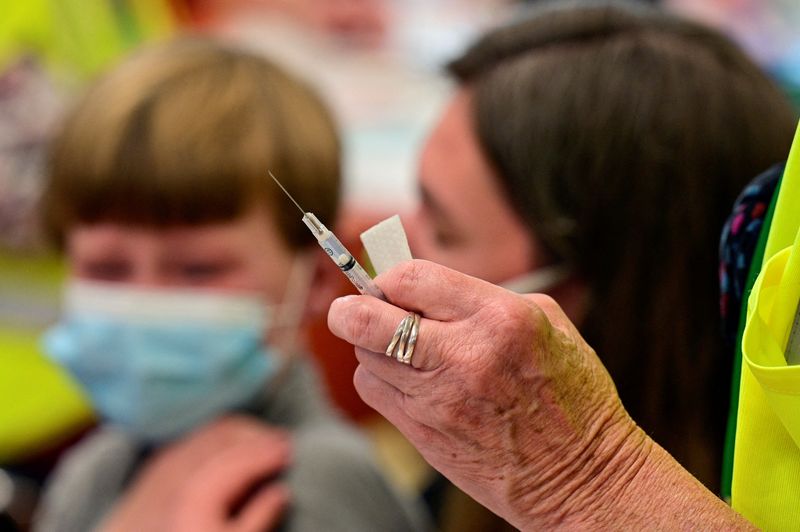By Nancy Lapid
(Reuters) - The following is a summary of some recent studies on COVID-19. They include research that warrants further study to corroborate the findings and that has yet to be certified by peer review.
Small children are getting less sick from Omicron
In very young children, the Omicron variant of the coronavirus causes less severe disease than the Delta variant, according to a new study.
Researchers reviewed data on nearly 80,000 U.S. children under age 5 with a first infection, including 7,201 infected in late December or early January when Omicron was causing more than 90% of cases. After accounting for other risk factors, including medical conditions and socioeconomic circumstances, researchers found children infected during the Omicron surge had a 29% lower risk of emergency department visits, a 67% lower risk of hospitalization, a 68% lower risk of needing intensive care, and a 71% lower risk of needing machines to breathe, compared to children infected with Delta. However, "because of Omicron's increased transmissibility, the overall number of emergency department visits, hospitalizations, ICU admissions, and mechanical ventilator use in children may still be greater" with Omicron than with Delta, according to a report posted on medRxiv ahead of peer review.
The investigators have also observed that infection rates were disproportionately higher in Black and Hispanic children for both Omicron and Delta for this age group, and the gap widened for infections with Omicron, said study leader Rong Xu of Case Western Reserve University School of Medicine. Not yet published data shows that "children under 5 had the highest infection rate with Omicron" compared to older children and adults in all age groups, she said.
Genetic mutation protects against severe COVID-19
New findings add to evidence that people with a certain version of a gene are less likely to develop severe COVID-19.
Earlier research had identified a specific group of genes, called the OAS1/2/3 gene cluster, as being involved in the risk for severe COVID-19. One version of a gene in that cluster - passed down from Neanderthals - appeared to protect against severe disease, reducing the risk by about 23%. The earlier research was done mainly in people of European ancestry. According to a report published in Nature Genetics, researchers now see the same association of this genetic variant with less severe COVID-19 in people of African ancestry.
"The fact that individuals of African descent had the same protection allowed us to identify the unique variant in the DNA that actually protects from COVID-19 infection," coauthor Dr. Jennifer Huffman of said in a statement. OAS genes are involved in a cascade of effects that help cells fight viruses, the researchers said. Understanding of these genes and their effect on COVID-19 risks could aid development of future drugs, they added.
Fewer Delta breakthroughs with Moderna (NASDAQ:MRNA) vs Pfizer/BioNTech
When the Delta variant of the coronavirus was prevalent in the United States, recipients of two doses of Moderna's mRNA vaccine were less likely to experience a breakthrough infection - and if they did, were slightly less likely to be hospitalized - than recipients of two doses of the mRNA vaccine from Pfizer (NYSE:PFE) and BioNTech, a large study found.
Researchers analyzed health records of more than 637,000 vaccine recipients who were not previously infected with the virus and had not gotten a booster shot. As reported on Thursday in JAMA, breakthrough infections steadily increased every month from July to November 2021, with higher rates in the Pfizer/BioNTech group. In November, there were 2.8 cases among every thousand people vaccinated with the Pfizer/BioNTech shots, compared to 1.6 cases per thousand recipients of the Moderna vaccines. The vaccines protected equally well against death, but the hospitalization rate was 12.7% for infected Moderna recipients and 13.3% for Pfizer/BioNTech recipients. When the researchers compared 62,584 Moderna recipients to a closely-matched equal-sized group of Pfizer/BioNTech recipients, the risk for breakthrough infection was 15% lower in the Moderna group.
"Although there is a difference in breakthrough infections, both vaccines are highly protective against SARS-COV2 infection and especially against the most severe consequences of infection," said coauthor Pamela Davis of Case Western Reserve University School of Medicine in a statement.
Click for a Reuters graphic on vaccines in development.
